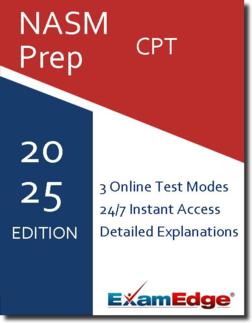NASM CPT (NASM-CPT) Practice Tests & Test Prep by Exam Edge - Test Reviews
Based on 32 Reviews
- Real Exam Simulation: Timed questions and matching content build comfort for your NASM CPT test day.
- Instant, 24/7 Access: Web-based NASM Certified Personal Trainer practice exams with no software needed.
- Clear Explanations: Step-by-step answers and explanations for your NASM exam to strengthen understanding.
- Boosted Confidence: Reduces anxiety and improves test-taking skills to ace your NASM Certified Personal Trainer (NASM-CPT).

NASM CPT (NASM-CPT) Practice Tests & Test Prep by Exam Edge - Review
NASM Certified Personal Trainer - Reviews
Excellent
Based on
160
reviews
See why our users from 154 countries love us for their exam prep! Including 32 reviews for the NASM CPT exam.
Exam Edge is an Industry Leader in Online Test Prep. We work with our Institutional Partners to offer a wide array of practice tests that will help you prepare for your big exam. No Matter how niche field of interest might be, were here to help you prepare for your test day.
| 2.8M | 4.5M | |
| Users | Tests Taken | |
| 100K | 19 | |
| Unique Exams | Years in Business | |


